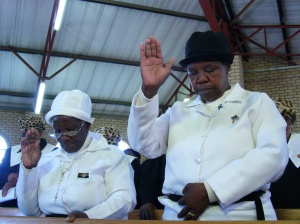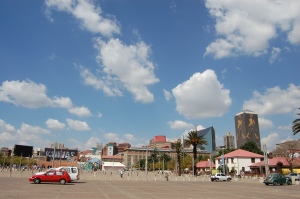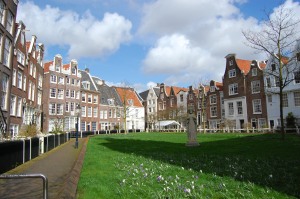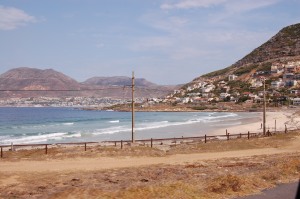Posts Tagged ‘Johannesburg’
Anniversary of the Xenophobic Attacks

Two women pray during a church service commemorating the xenophobic violence of May 2008
This past week, I covered a church vigil in the Johannesburg township of Alexandra. The service, which was attended by about 50 Alex residents, commemorated the xenophobic attacks of May 2008.
One year ago, 62 foreigners were killed by angry mobs who felt threatened by Zimbabweans and other Africans who “were taking their jobs.” Pictures of maimed and burning bodies shocked the world, just as the violence in Kenya earlier last year had. It goes to show you that democracy is a fragile thing and a flourishing state can just as quickly turn into an illiberal democracy.
The aftermath of the xenophobic violence is still apparent in South Africa. Right after the attacks, thousands of foreigners were displaced from their homes in townships like Alexandra and Ramaphosa into squatter camps. Zimbabwean refugees still squat at the Central Methodist Church in downtown Johannesburg. The rioters and murderers still roam the streets of Johannesburg freely and boast of their shameful exploits, according to a recent Times story by my colleague Benjamin Bradlow. Xenophobia is alive and well in parts of the Rainbow Nation, which holds the credo of tolerance and non-racialism to the utmost reverence.
Working on this story made me realize how reconciliation can be such an empty-handed gesture. Sure, people can pray, ask forgiveness and vow never again. Yet, the legacy of apartheid continues to exist in South Africa. The senseless nature of the violence in South Africa – the burning and the brutal beating of foreigners last year – mirror the violence that pervaded South Africa during the apartheid era. And was the church packed with South Africans and foreigners united against xenophobia? Organizers blamed the low turnout on a misunderstanding, but do they really suppose scores of Alexandra residents really want to relive this shameful period in their history? Community leaders can say one thing, but the ordinary South African would probably rather forget such atrocities ever occurred in their neighborhoods.
It’s this conflicting duality in South Africa that continues to astonish me. You can cover some of the most extravagant events, like a 75-million Rand inauguration ceremony that celebrates the conclusion of a free, fair and democratic election, and the next week, cover the aftermath of horrific violence in poor townships. It’s a constant culture shock, one I’m not sure I will ever get over.
Vodpod videos no longer available.
– 30 –
Election II

Voters in queue at Joubert Park
Here’s an abbreviated account of my election day activities:
First, I tagged along with a print reporter for The Times to three polling stations in Johannesburg. We were working on a story comparing the polling environment in the affluent suburb of Illovo and the urban center of Hillbrow and Joubert Park. Suffice it to say, it was quite a comparison.
The polling station in Illovo was at a country club, so from the get-go, you already knew what kinds of people would flock there. However, there was quite a diversity among all the people voting there. Retirement-age people stood in line with university students. White people waited next to black people. Domestic workers queued up alongside business-owners. I think it was the first time I’ve seen such intermingling across class and ethnic lines on a large scale in South Africa.
After speaking with a couple of the people there, we quickly drove down to Hillbrow, a place where my professors told me never to venture to. Even our guide during orientation week refused to take us through Hillbrow, that’s how dangerous it is. To drive this point home, the print reporter I was with was hesitant to go to Hillbrow using her own car and without another photographer. I wasn’t too worried though, having walked through that area on the way back from the Siyanqoba Rally. The main road right by the park is actually quite beautiful, and I don’t recall ever being that scared I would be mugged. Maybe I’m being too naive.
We only stayed in Hillbrow for a short period of time, since we were only stopping by the polling station. The voters were were very homogeneous: black, working class people from Johannesburg’s most notorious urban neighborhood. After only a few interviews, we quickly made our way to Joubert Park, the largest polling station in South Africa with thousands of registered voters.
Election Day is tomorrow!

SA President Kgalema Motlanthe
It’s not common nowadays to say it’s a great time to be a journalist. After all, the industry is shrinking, newspapers are going bankrupt (especially in the States) and the profession is at a crossroads in terms of forming a sustainable business model since the advent of free content online. But I have to say, it ain’t so bad being a journalist in South Africa.
Print reigns in South Africa because Internet penetration is so low. There is still a culture of reading physical newspapers in this country, and papers like the Sunday Times, Daily Sun, The Star and Beeld are generally doing better than American papers. Of course, this will change as South African broadband increases, but for now, the few media companies operating here are making good money.
Not only is the business model quite buoyant here, the stories are far more interesting than in the States. There are stories here that will make you cry. Others will make you shake your head. There are a bunch that will make you smile. I hope to be smiling a lot tomorrow.
Tomorrow is Election Day in South Africa. It was fewer than 15 years ago that racial and political intolerance pervaded South African society, so it’s incredible to see a fledgling democracy largely consolidated if not ingrained into the South African psyche. Sure, there are problems here just as in any other country. Sure, voter turnout has declined and people are starting to turn away from the polls “in protest.” But talking with ordinary South Africans during the past few weeks has instilled within me hope for a lasting democratic South Africa. Tomorrow, upwards of 20 million voters will wait in line at polling stations, cast their paper ballots and get their fingers inked. Considering the long history of oppression here, it’s pretty amazing.
So I saw Nelson Mandela today…

Nelson Mandela
Today, the ANC hosted what many called South Africa’s largest political rally. Over 100,000 people crammed into two stadiums in Ellis Park in Johannesburg: Coca-Cola Stadium and Johannesburg Stadium. I made it into the media centre at around 8:30 a.m., about half an hour before the official start of the rally. People from all over South Africa and beyond gathered in Coca-Cola Stadium mainly to see Jacob Zuma, the man who will most likely ascend to the presidency of South Africa by the end of next week.
It would be an understatement if I said this rally was massive. Just in the press area, I met people from Germany, Madagascar, Zambia and England in a span of a few hours. Right now, I’m watching Al Jazeera’s coverage of the rally and I just finished reading the NYT’s story about the rally. Indeed, this was truly an international event.
What some of us in the newsroom had surmised, but what I still found surprising, was Nelson Mandela’s appearance at today’s Siyanqoba “Victory” Rally. The 90-year-old Madiba, as Mandela is reverently called, was clearly frail, as he had to be helped up to the stage by Jacob Zuma and his ex-wife, Winnie. I had situated myself as close to the stage as possible, and so when the golf cart with Zuma and Mandela rolled into the stadium, I couldn’t see what was going on except that everyone on the field was running. Running toward that golf cart making its way around the stadium toward the stage.
As soon as the cart reached the stage, the media section went crazy. Everyone had figured out by then that Madiba was in the house. I must’ve been elbowed more than few times as photographers and videographers like me jockeyed for a clear shot of the former South African president. There was this one photographer who kept coughing on me, saying “I have TB, you better move to the back.” I sure hope she was kidding and only vying for my spot.
Boxed in and jostled around by competing journalists, I found it nearly impossible to shoot good footage until all the ANC leaders were seated. ANC secretary Gwede Mantashe, Winnie Mandela, Nelson Mandela, Jacob Zuma and other political leaders from COSATU and SACP were in attendance. They all began their rounds speaking and rallying the crowd with praise and liberation songs.
Election Coverage Part 1
 I apologize for my lack of posts lately. Work has consumed my life, but the stories are amazing, and I feel like I’m getting a better understanding of the country every day. Today, I traveled an hour out to Pretoria to see the Independent Electoral Commission reopen its Results Operation Centre, or ROC. There’s really no US equivalent to it, but it’s basically a place where politicians, government officials and the media can gather on election day to oversee voting, the counting of the votes and finally the announcement of the winner. Check out the video I filed after coming back to the newsroom at like 5 p.m. I never knew traffic was that bad between Jo’burg and Pretoria.
I apologize for my lack of posts lately. Work has consumed my life, but the stories are amazing, and I feel like I’m getting a better understanding of the country every day. Today, I traveled an hour out to Pretoria to see the Independent Electoral Commission reopen its Results Operation Centre, or ROC. There’s really no US equivalent to it, but it’s basically a place where politicians, government officials and the media can gather on election day to oversee voting, the counting of the votes and finally the announcement of the winner. Check out the video I filed after coming back to the newsroom at like 5 p.m. I never knew traffic was that bad between Jo’burg and Pretoria.
I’ve been officially credentialed to cover the election next week in Pretoria. I’m absolutely excited to hang out at ROC for a few days and get caught up in the political frenzy of the elections, despite the fact that we all know who’s going to win.
Here are some differences I’ve discovered between South Africa and the United States with regards to election practices and election coverage by the SA media:
- In South Africa, you vote for a political party that will nominate and place a candidate to the presidency. In the United States, it’s complicated with the popular and electoral college votes.
- In South Africa, there’s still not much coverage of the fundraising game. Money and campaigning stories go hand in hand in the United States, but since South Africa just started to allow political TV advertisements this year and the inner workings of the political parties are a mystery, the whole who’s outspending who isn’t really discussed.
- There is a lot of fuss about transparency, electoral observers and voting procedures in South Africa. It’s a young democracy still, and legitimacy is paramount. This isn’t to say these issues aren’t important in the US – I feel like it’s just more pronounced here in South Africa.
- Voting methods are different. In a nutshell, paper ballots and finger inking occur in South Africa. A wide range of voting methods from paper to electronic machines are utilized in the United States.
- South African expats, who have previously registered, voted abroad today. They had to wait in long lines outside of South African missions to vote. Registered US citizens, on the other hand, can mail in their absentee ballot from abroad.
- The vote-counting process takes a lot longer in South Africa. Tentative results are usually released by the following day and the official outcome is usually announced two or three days after election day. Aside from the 2000 election, I feel like the United States has had a relatively quicker turnaround time.
These are just a few of my initial electoral comparisons. I’ll leave you all with a few photos from this past weekend. We hung out with lion cubs and other wild animals in the Rhino and Lion Nature Preserve. Check out my photos after the jump!
A bit of America in South Africa
 Last night, we celebrated the end of our first week of work by taking a trip to Fourways just outside of Johannesburg. Amid the rolling fields, the Coca-Cola Zero Festival was hosting some South African bands and some international headliners, including Snow Patrol, Oasis and Panic! At the Disco.
Last night, we celebrated the end of our first week of work by taking a trip to Fourways just outside of Johannesburg. Amid the rolling fields, the Coca-Cola Zero Festival was hosting some South African bands and some international headliners, including Snow Patrol, Oasis and Panic! At the Disco.
The Coke Zero concert in Johannesburg is a 12-hour music festival, one of the largest in Africa. When we got there, I found that it was somewhat akin to Lollapalooza in Chicago, except with one humongous stage in the middle of bucolic farmland. Concert organizers had estimated that 60,000 people would be in attendance. I don’t know the final count, but there were definitely a couple thousand people there. (EDIT: The Times reported about 20,000 people were in attendance – see the video here: http://multimedia.thetimes.co.za/videos/2009/04/coke-zero-fest-rocks-jozi/)
It was disorienting to see so many white South Africans at Coke Fest. The fact that most of the concert-goers were white wasn’t at all that surprising, since I don’t see many black South Africans listening to Oasis or Snow Patrol. Their sheer numbers were jarring because walking down Jo’burg CBD and driving the streets, you just don’t see that many white people. At least not all in one place.
Another thing that struck me about the concert, besides the awesome music, was how American everyone looked. Seriously, I felt as if I were in the States again just by looking at what the concert-goers were wearing. There were two white Zimbabwean men standing right next to us with cowboy hats and one was wearing a Billabong jacket! Teens were wearing hipster clothes. Coca-Cola signs were everywhere. Albeit, Snow Patrol changed their “Hands Open” lyrics from Chicago to Johannesburg, but still, I never felt like I was in Africa for those few hours we were there. I wish we were able to go to the concert in the daytime to see some of the South African bands like Zebra & Giraffe, but oh well…
Tonight, we’re heading to downtown Jo’burg to see “MacBeki” at Market Theatre. It a tragi-comedy written and directed by Pieter-Dirk Uys, a notable South African satirist. I hope I’ll be able to understand most of the Thabo Mbeki political references and how it’s linked to Shakespeare’s work. (EDIT: There was a lot of it I understood, but then again, there were some things I didn’t get at all. Overall, not too shabby for this “ignorant American”…)
Tomorrow, we’ve arranged for Elvis, our beloved orientation tour guide, to take us to the Cradle of Humankind, a world heritage site, to see some hominid exacavation sites. Then, we’ll go see some rhinos and play with lion cubs. I’m definitely looking forward to it all!
– 30 –
Jo’burg Orientation
 Interviews. It’s a staple of journalism my classmates and I have been practicing since orientation week began for us on Monday. The past two days have been a whirlwind of tours, meetings and talks with various media and political organizations in Johannesburg, a sort of crash course in South African institutions.
Interviews. It’s a staple of journalism my classmates and I have been practicing since orientation week began for us on Monday. The past two days have been a whirlwind of tours, meetings and talks with various media and political organizations in Johannesburg, a sort of crash course in South African institutions.
Orientation week was organized by Medill and Fray Intermedia, a press association that trains journalists in South Africa. Our guide Elvis and journalist Michael Schmidt have graciously introduced us to hospital representatives, spokesmen for the ruling political party, head of the South African public broadcaster, the editor of the oldest newspaper in South Africa (older than the WSJ!) and other fascinating individuals involved in South Africa’s development.
We visited two hospitals this week. One hospital was focused on HIV/AIDS research and the other was a clinic working with TB and HIV/AIDS patients. During one of the visits, we got a tour of the clinic. People sat in rows and rows of chairs, waiting in line for test results, treatment and counseling. I couldn’t help but wonder how many of these patients will die of HIV/AIDS. If we go by statistics, one in every five people who were in that very hospital had HIV and without adequate medical treatment, will die of AIDS complications. Walking through the hospital wards and seeing the faces of these people really humanized this often faceless and underreported disease.
The doctors discussed the complex nature of the HIV/AIDS epidemic in South Africa. While there are condoms and antiretrovirals widely available because of government, PEPFAR and USAID funding, there is such an overwhelming stigma attached to the disease that people are afraid to get tested and treated. Other factors, such as traditional healers and churches can be a problem when they advocate herbs and a faith-cures-all attitude instead of life-saving drugs. These hospitals are hoping to change that by educating traditional healers and church leaders and making them a part of the solution in destigmatizing AIDS.
First Impressions of South Africa!
So I made it. I’m here, at last, in the Rainbow Nation! Since my Internet access has been spotty for the last 48 hours or so, here’s a recap of Amsterdam and my first day in Jo’burg.

A hidden garden in Amsterdam
Amsterdam:
My last day in Amsterdam, which was a gorgeous sunny one, was spent on two walking tours, one of the city itself and the other of the Red Light District. Both tours were fantastic, and gave me a greater understanding and appreciation for the city. I learned that due to the rise of the Christian Right in the Netherlands, the unique Red Light District may not exist in its current fashion by 2012, which is quite sad. Amsterdam won’t shake off its seedy reputation anytime soon, and closing the Red Light District will only drive sex workers underground. You just can’t wipe away a 800-year-old institution from society that easily. I did ponder though, what would Amsterdam look like if it were a fashion capital like Paris or Milan? I guess I’ll have to watch Cycle 11 of America’s Next Top Model to find out.
I also got a chance to see a few museums, notably the Van Gogh Musuem and the Rijksmuseum. Starry Night was being exhibited at the Van Gogh museum, and I loved how the museum set up the paintings chronologically to show how Van Gogh experimented with Pointillism and other art styles. The Rembrandts were interesting, but unfortunately, most of the Rijksmuseum was closed due to renovation, so I didn’t get a chance to really experience the museum to its fullest. I guess it was all good, since I was so tired from walking around the city so much!
Johannesburg:
Jo’burg has been a whirlwind so far. Once most of my classmates landed, we were taken to our hotel in Melville, a pretty safe neighborhood of the city. There was a blackout when we arrived, but it really didn’t matter since it was past midnight and we were extemely exhausted from the flight.

A boy runs down a side street near the location of the 1976 Soweto student uprisings.
This morning, we were taken on a tour of Johannesburg, the Soweto Township in particular. As Elvis, our guide, told us, Soweto is a city within a city, housing more people than Jo’burg itself. While the former township has quite a bad reputation for being a crime-ridden slum, there seems to have been vast improvements. There are lush green trees lined all around the roads, and people seem to be doing all right, at least in the areas where we were driven. As we walked around the Maponya Mall, the largest mall in Jo’burg and the first to have escalators, I felt as if I was walking around the Garden State Plaza Mall. Of course, I know there are hundreds of poor people still living in Soweto, but I never felt unsafe walking around, acting all touristy, in Soweto. It was not what I had expected.
We saw the Apartheid Museum today. Unfortunately, we were allotted only a hour to go through the entire complex, which usually takes four hours to do the history justice. Since the tickets were only $3, I will definitely try returning to the museum. We were arbitrarily given race classification pass cards to emulate the conditions of apartheid. On the whole, the museum was very history-driven, with lots of information placards chronicling the events leading up to Apartheid and its subsequent fall. The odd thing about the museum was its location: right next to a casino and a theme park. It was eerie how we could hear screaming people riding on roller-coasters while reading about torture, hangings, shootings and other atrocities committed during apartheid.
Afterwards, we stopped for lunch at Robby’s Place. Monica Lewinsky apparently visited the place on Nov. 7, 2004, according to the guestbook. I don’t know what she was doing in South Africa, but I thought it was tacky she wrote she was from the “White House, USA.” After filling our stomachs with a delicious South African meal of food I cannot begin to name, we visited two traditional healers, who said they were able to treat HIV/AIDS and other diseases by talking with our ancestors. From that visit, I began to understand the complex nature of medicine in South Africa, how someone who doesn’t know better can get lured into taking herbs instead of antiretrovirals or forgo condoms just because the Pope said that they can increase the problem of AIDS.
We capped off the day with a short visit to the Nelson Mandela House (closed when we arrived – will have to come back), Winnie Mandela‘s house, Desmond Tutu‘s house, the location of the Soweto student uprising in 1976 and Freedom Plaza, where the ANC charter, written in 1955, is memorialized. Indeed, today was a day full of history. I’m really glad I came.
– 30 –
A note about photos: Internet access is slow and sometimes intermittent where I will be staying, so please bear with me on the visuals front.
Thanks for reading!


